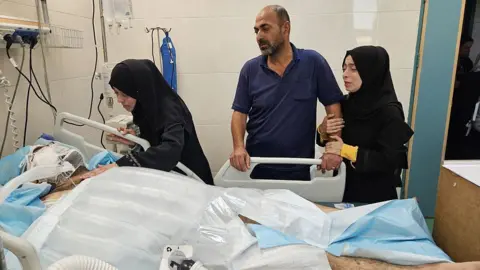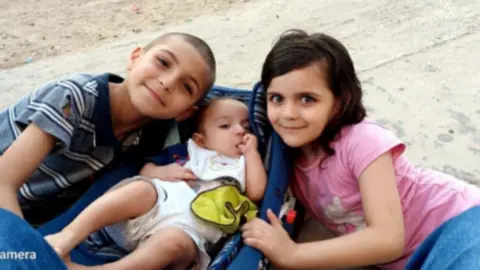Father of nine children killed by Israeli strike still in critical condition
 Getty Images
Getty ImagesThe husband of a Palestinian doctor in Gaza whose children were killed in an Israeli strike on Friday remains in critical condition, according to the hospital treating him.
Hamdi al-Najjar's "life remains in danger", Dr Milena Angelova-Chee, a Bulgarian doctor working at Nasser hospital in Khan Younis, told the BBC.
An Israeli strike killed nine of the couple's 10 children on Friday and left him and the couple's 11-year-old son injured. The Israeli military has said the incident is under review.
The Red Cross meanwhile said two of its staff were killed in a strike on their home in Khan Younis on Saturday.
The killing of Ibrahim Eid, a weapon contamination officer, and Ahmad Abu Hilal, a security guard at the Red Cross Field Hospital in Rafah "points to the intolerable civilian death toll in Gaza", the ICRC said, repeating its call for a ceasefire.
On Sunday the Hamas-run health ministry said Israeli air strikes had killed 23 people since dawn, including a senior rescue service official and a journalist.
Ashraf Abu Nar, a senior official in the territory's civil emergency service, and his wife were killed in their home in central Gaza, health officials said, while journalist Hassan Majdi Abu Warda and several family members were killed by a strike on his home in Jabalia in northern Gaza.
Hamdi al-Najjar - a doctor like his wife - sustained significant injuries to his brain, lungs, right arm, and kidney in Saturday's attack, Dr Angelova-Chee said.
The hospital is "doing everything we can for him", she added.
The couple's surviving son Adam was also injured. Dr Angelova-Chee said her colleagues had told her he was doing "reasonably well".
Dr Alaa al-Najjar was working at Nasser hospital when the Israeli attack happened. Video shared by Health Ministry Director Dr Muneer Alboursh and verified by the BBC showed small charred bodies being lifted from rubble.
The nine children - Yahya, Rakan, Raslan, Gebran, Eve, Rival, Sayden, Luqman and Sidra - were aged between just a few months old and 12.
 al-Najjar family
al-Najjar familyHer colleague faced "unspeakable suffering", Dr Angelova-Chee said.
Right now Alaa's "priority is her family", she said, adding: "She's not the only one who faces this, many families are in the same position."
"Everybody is really shocked because this continues already 18 months and it's compounded by constant threat of death, constant relocations and evacuations," she said.
The Israel Defense Forces (IDF) said on Saturday that its "aircraft struck a number of suspects who were identified operating from a structure adjacent to IDF troops in the area of Khan Younis".
It said the Khan Younis are was a "dangerous war zone" and the IDF had told people to leave for their own safety. On Monday the IDF said people in Khan Younis governorate should leave ahead of an "unprecedented attack" in one of the largest such evacuation orders in recent months.
Some Palestinians told the BBC they had not left because "because there is no place to go". According to the UN, about 81% of the territory is now either subject to Israeli evacuation orders or located in militarised "no-go" zones.
Israel resumed air strikes and ground operations on 18 March and these have since killed 3,785 Palestinians, the health ministry says.
Speaking after the strike that killed the nine al-Najjar children, an Israeli woman who was held hostage in Gaza told a rally in Tel Aviv that air strikes were what she feared most while in captivity.
Naama Levy - one of five female surveillance soldiers abducted during the 7 October attack led by Hamas - said that each time air strikes began she was convinced she would die. She said she feared for the lives of remaining hostages in Gaza.
Israel also imposed a total blockade on Gaza on 2 March that lasted 11 weeks before it allowed limited aid to enter the territory in the face of warnings of famine and mounting international outrage.
Israeli military body Cogat said on Saturday morning that 388 trucks carrying aid had entered Gaza since Monday. The UN says much more aid - between 500 to 600 trucks a day - is needed.
The World Food Programme (WFP) told the BBC that no more trucks had entered Gaza on Saturday, and there had been a halt in the distribution of bread due to "severe security threats" faced by bakeries.
"Operations in the current imposed conditions are not viable," the spokesperson said.
WFP Director Cindy McCain later told the BBC's US partner CBS News that more trucks needed to enter Gaza "at scale" because there were "500,000 people inside of Gaza that are extremely food insecure, and could be on the verge of famine if we don't help bring them back from that."
She said the looting of aid trucks since Israel partially eased its blockade was carried out by civilians who she described as "poor souls" who "are really, really, really desperate."
Dr Angelova-Chee said her colleagues at the hospital were working "hungry", with one telling her on Saturday that he had only a couple more small packets of date biscuits left to eat.
Israel has said the blockade was intended to put pressure on Hamas to release the hostages the Palestinian armed group Hamas is still holding in Gaza. Israel also accuses Hamas of stealing supplies, which the group has denied.
On Sunday Israeli army chief Eyal Zamir visited Israeli troops in Khan Younis and told them that "this is not an endless war" and that Hamas had lost most of its assets and capabilities, the IDF said in a statement.
Israel launched a military campaign in Gaza in response to Hamas's cross-border attack on 7 October 2023, in which about 1,200 people were killed and 251 others were taken hostage.
At least 53,939 people, including at least 16,500 children, have been killed in Gaza since then, according to the territory's health ministry.
